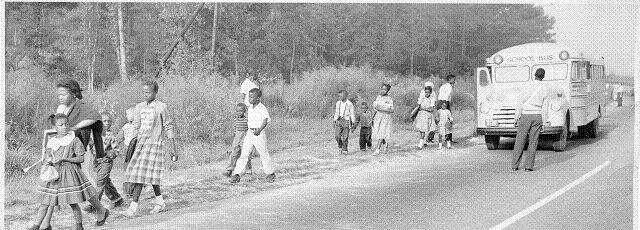
Black children walking to school pass a white children's school bus Calhoun County, S.C. 1945
The Black Sergeant and the White Judge Who Changed Civil Rights History - The New York Times: “Unexampled Courage,” by Richard Gergel, is a riveting account of the 1946 legal case that spurred the federal government to act in defense of racial equality.
Briggs v. Elliott - South Carolina's Equalization Schools 1951-1960: Briggs v. Elliott (1947-1951) The advent of World War II brought the nation, and Charleston County, out of the Great Depression. War spending improved the economy, especially in North Charleston as...
J. Waties Waring - dissenting
As heretofore shown, the courts of this land have stricken down discrimination in higher education and have declared unequivocally that segregation is not equality. But these decisions have pruned away only the noxious fruits. Here in this case, we are asked to strike its very root. Or rather, to change the metaphor, we are asked to strike at the cause of infection and not merely at the symptoms of disease. And if the courts of this land are to render justice under the laws without fear or favor, justice for all men and all kinds of men, the time to do it is now and the place is in the elementary schools where our future citizens learn their first lesson to respect the dignity of the individual in a democracy.
To me the situation is clear and important, particularly at this time when our national leaders are called upon to show to the world that our democracy means what it says and that it is a true democracy and there is no under-cover suppression of the rights of any of our citizens because of the pigmentation of their skins. And I had hoped that this Court would take this view of the situation and make a clear cut declaration that the State of South Carolina should follow the intendment and meaning of the Constitution of the United States and that it shall not abridge the privileges accorded to or deny equal protection of its laws to any of its citizens. But since the majority of this Court feel otherwise, and since I cannot concur with them or join in the proposed decree, this opinion is filed as a
dissent.
dissent.

No comments:
Post a Comment